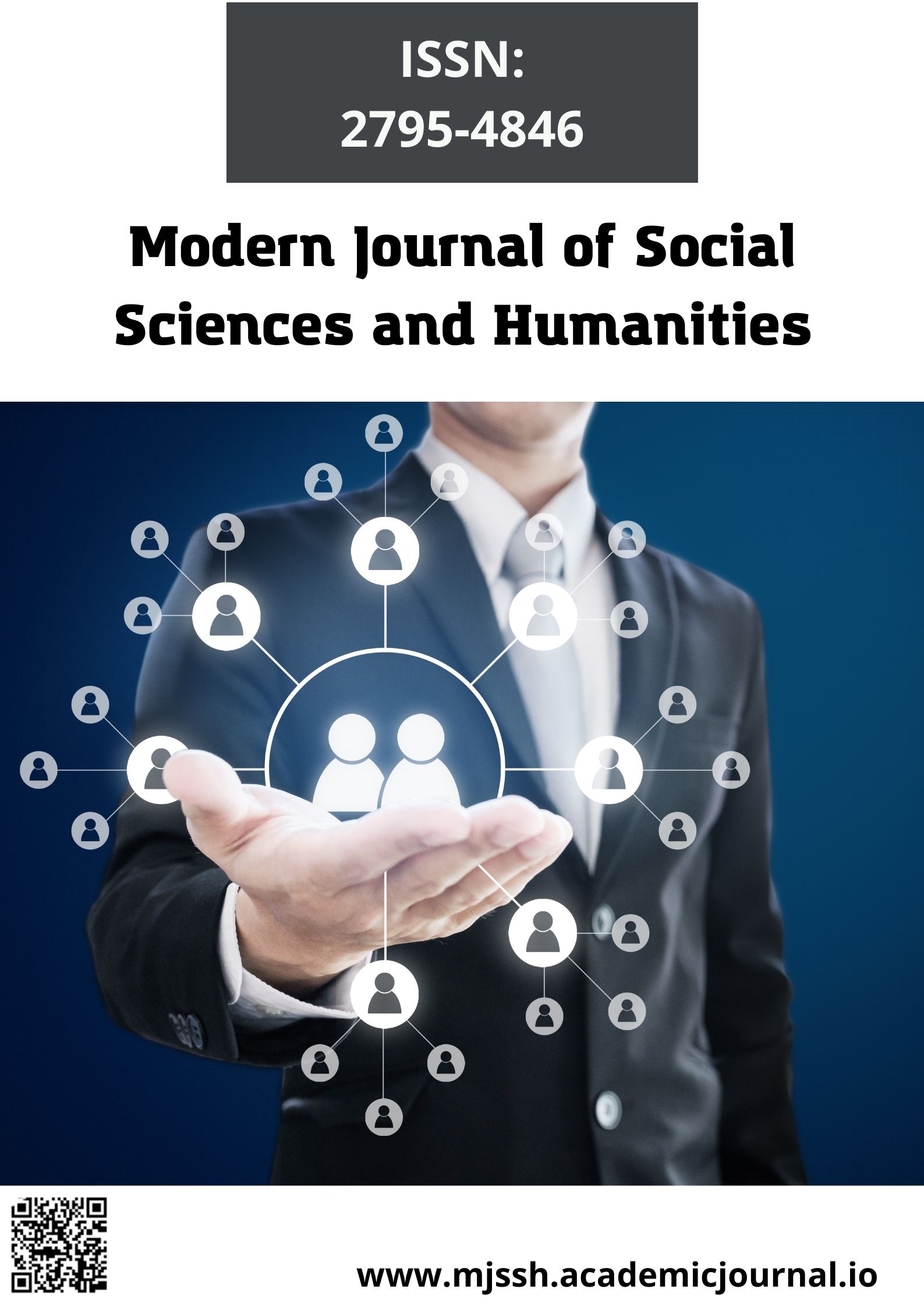FORMATION OF TEXT ANALYSIS IN LINGUISTICS
DOI:
https://doi.org/10.51699/mjssh.v1i4.70Keywords:
text, analysis, language unit, degree, lexical meaning, general content, additional toolAbstract
This article discusses the manifestations of personality traits, character and nature of people, a new approach to text analysis, the need for the importance of language units, which do not characterize the parts that express a specific lexical meaning and general content, but complement them, forming an opinion. Theoretical and practical data on the main role of additional tools are analyzed.
References
Mirziyoev Sh.M. Erkin va farovon, demokratik O'zbekiston davlatini birgalikda barmo etamiz. O'zbekiston Respublikasi Prezidenti lavozimiga kirishish tantanali marosimiga bag'ishlangan Oliy Majlis palatalarining qo'shma majlisidagi nutq. – Toshkent: «O‘zbekiston» NMUI, 2016.
Sushinskiy I.I. Kommunikativnaya-pragmaticheskaya kategoriya aktsentirovaniya i yeyo rol v verbalnoy kommunikatsii // Voprosy yazykoznaniya. №6. – M., 1987.
Hakimov, M. (2013). O‘zbek pragmalingvistikasi asoslari. T.: Akademnashr.
Ibragimova, E. I., Zokirov, M. T., Qurbonova, S. M., & Abbozov, O. Q. “Filologiyaning dolzarb masalalari” mavzusidagi Respublika ilmiy-amaliy internet-konferensiya materiallari: Ilmiy ishlar to‟ plami.–Farg‟ ona, 2018.–113 sahifa.
Zokirov, M. T. (2021). ABOUT THE INTERRELATIONSHIPS OF LINGUISTICS AND PSYCHOLOGY. Theoretical & Applied Science, (4), 422-425.
Zokirov, M. T. (2021). To typology of language situations. ISJ Theoretical & Applied Science, 11 (103), 706-710.
Hakimov, M. (2013). Fundamentals of Uzbek pragmalinguistics. Tashkent: Akademnashr.
Nurmonov, A., & Hakimov, M. (2001). Theoretical formation of linguistic pragmatics. Uzbek language and literature, 4, 54-58.
Mamajonov, M. (2019). ON THE MATTER OF PRAGMATICS OF NAMES IN UZBEK LANGUAGE. Theoretical & Applied Science, (11), 316-318.
Turdaliyevich, Z. M., & Farhod, I. (2022). Loiq Is the Successor of the Great Figures Of Tajik Literature. International Journal of Culture and Modernity, 14, 51-55.
Zokirov, M. T. (2021). MASTERY OF USING TABOOS AND EUPHEMISMS BY ABDULLAH QADIRI. Theoretical & Applied Science, (5), 112-115.
Turdaliyevich, Z. M. (2022). Actual Problems of Bilingualism in a Multi-Ethnic Environment. International Journal of Culture and Modernity, 13, 17-23.
Zokirov, M. (2007). Lingvistik interferensiya va uning o'zbek-tojik bilimimizda namoyon bo'lishi. MDA-Toshkent.
Zokirov, M., & Isomiddinov, F. (2020). December. ABOUT THE HOLES OF LANGUAGE LANGUAGE DICTIONARY. Конференции.
Maftuna, G. (2022). Methodology of Organizing Problem Lessons in Higher Education. International Journal of Culture and Modernity, 14, 72-77.
Fattohov, K. K., & Umarova, N. R. (2021). THE USE OF ARABICISM IN THE WORKS OF NAVOI. Theoretical & Applied Science, (4), 426-428.
Vakhobovna, A. Z., & Xayrulloyevich, F. X. (2022). About Borrowing Phrazeological Units and their Study in Uzbek Language. International Journal of Culture and Modernity, 14, 61-67.
Abbozov, O. (2022). On The History of the Study of on mastic Units Related to Place Names in Linguistics. European Multidisciplinary Journal of Modern Science, 4, 116-121.
Axmadjonov, P. M. (2021). Sadriddin Ayni" Sample of Tajik literature" and some issues of zullisonayn in it. ISJ Theoretical & Applied Science, 12(104), 406.
Mahamadzoda, A. P. (2021, April). IMPORTANT FEATURES OF FAZLI NAMANGANI TAZKIRASI AND THE ISSUE OF ZULLISANAIN. In Archive of Conferences (Vol. 23, No. 1, pp. 5-7).
Kuldashev, N., Avazbek, D., & Parviz, A. (2022). Opinions of Our Ancestors on Language and Speech Purity. Journal of Ethics and Diversity in International Communication, 2(4), 10-16.
Kholmatov, D., & Dadajonov, A. PHILOSOPHICAL VIEWS AND IDEOLOGICAL SCOPE OF JALOLIDDIN RUMI’S WORKS. Zbiór artykułów naukowych recenzowanych., 162.
Xojaliyev, I., & Dadajonov, A. (2021). MUHOKAMANING SO’ZLASHUV USLUBIGA XOSLANISHIGA DOIR. Студенческий вестник, (19-11), 15-16.
Xojaliyev, I. T., & Jamolov, J. U. M. A. B. O. Y. (2021). About changes in the phonetic structure of words borrowed in Uzbek language from Tajik. ISJ Theoretical & Applied Science, 12(104), 478.
Porubay, I. F., & Ibragimova, E. I. (2021). ABOUT THE FEATURES OF SOCIAL MEDIA DISCOURSE (BASED ON THE EXAMPLES OF RUSSIAN AND ENGLISH LANGUAGES). Theoretical & Applied Science, (12), 482-486.
Alimova, Z. V. (2021). ABOUT COMMON WORDS IN UZBEK AND TAJIK LANGUAGES, THEIR SEMANTICS. Theoretical & Applied Science, (5), 101-104.
Alimova, Z. V., & Ashurova, Z. V. (2022). Ikki til o ‘rtasidagi mushtaraklik. Academic research in modern science, 1(1), 65-68.
АLIMOVA, Z. (2018). On the Uzbek loan-words with prefix no-from the Percian-Tajik languages. Scientific journal of the Fergana State University, 1(5), 109-112.
Зокиров, М., & Зокирова, С. (2010). ТИЛ ИНТЕРФЕРЕНЦИЯСИНИНГ МОҲИЯТИ ҲАҚИДА УМУМИЙ ТУШУНЧА. Известия ВУЗов (Кыргызстан), (6), 10-11.
Zokirov, M. T., & Ibragimova, M. S. N. (2021). Alisher Navoi about style problems. ISJ Theoretical & Applied Science, (12), 601-604.
Amonov, M. U. (2019). Accordance with the original of isafetic combinations in “Baburnama”. Scientific Bulletin of Namangan State University, 1(8), 239-244.
Umarovich, A. M. (2021). The proportion of arabic isophical compounds in the “Baburnoma” with the original. Academicia: an international multidisciplinary research journal, 11(2), 1554-1557.
Omonov, M. (2019). Morphological forms of persian izafet constructions in “Baburname”. Theoretical & Applied Science, (11), 260-263
Амонов, М. (2016). ТРАНСЛИТЕРАЦИЯ ИЗАФЕТНЫХ СОЧЕТАНИЙ В" БАБУРНАМЕ". Актуальные научные исследования в современном мире, (6-1), 95-98.
Amonov, M. U. (2021). On Arab borrowings, denoting the name of the profession, which is actively used in the Uzbek language. ISJ Theoretical & Applied Science, 11(103), 863-866.






